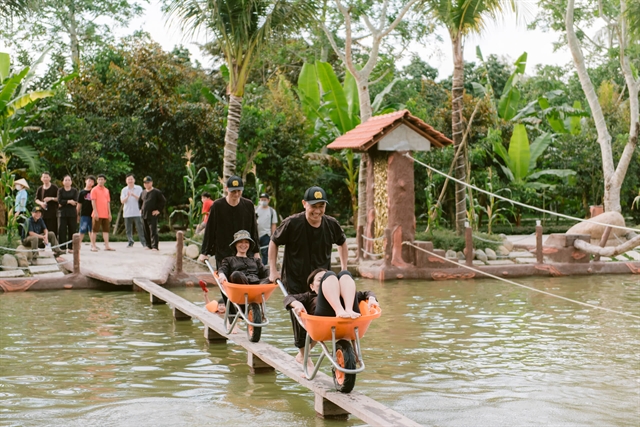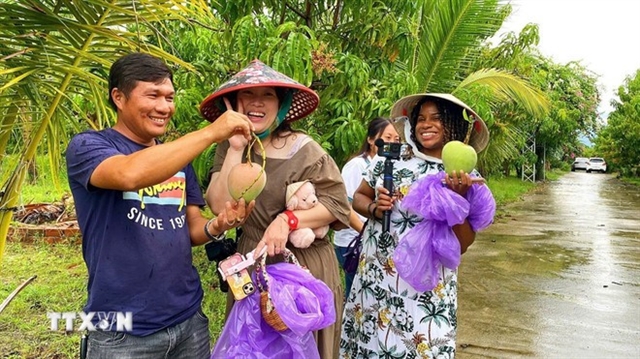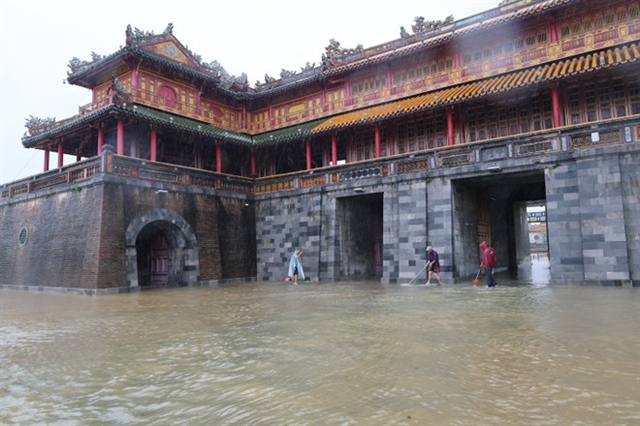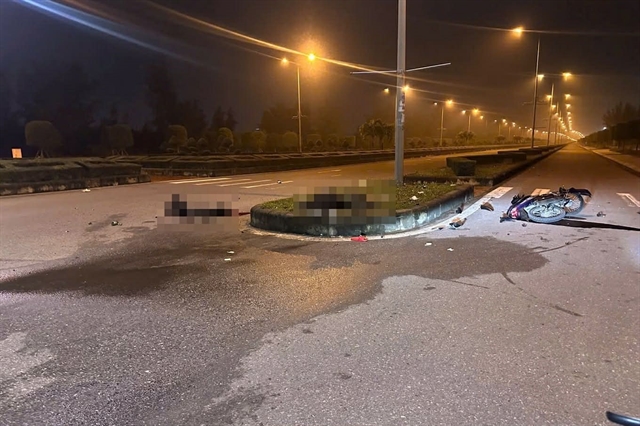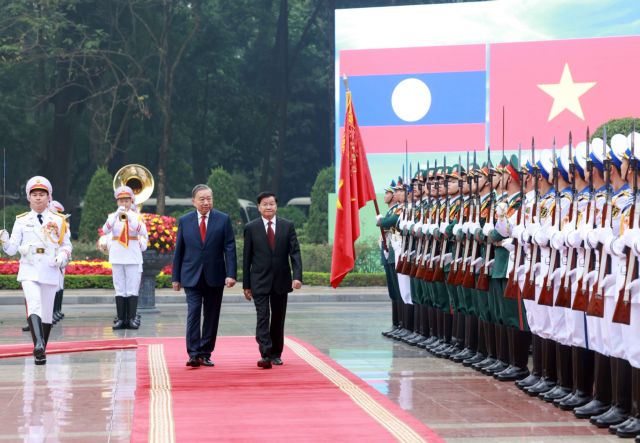

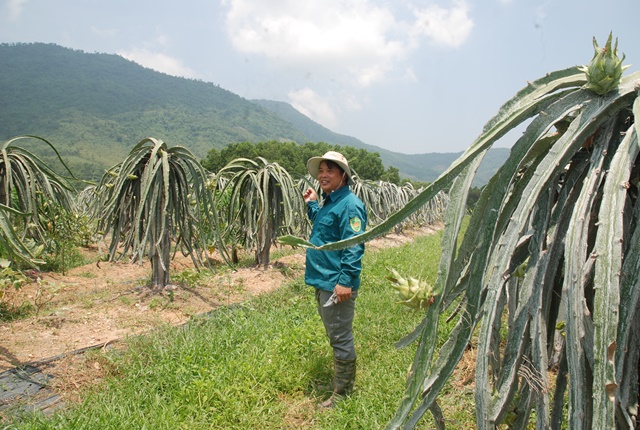
|
By Thanh Liên
Nguyễn Văn Hoàng in Vĩnh Phúc Province won the Outstanding Vietnamese Farmer award last year for successfully developing a red dragon fruit plantation which earned him VNĐ1.3 billion.
Hoàng was also the first farmer in the province’s Lập Thạch District to export his fruit to Malaysia and Chinese Taiwan in 2016.
He started growing the fruit in 2012. He and his wife sent their children and his parents to the southern province of Bình Thuận to learn the techniques necessary to grow red dragon fruit in addition to researching the process online.
Over the first years he faced many difficulties such as buying low quality saplings that produced small yields that were sour.
In 2015, Hoàng harvested his first high-quality fruit: sweet with a thin skin.
“The climate in the north is very harsh so we can only harvest from April to October compared with the south where the trees fruit all year round. I've invested all my time and efforts on nurturing my plants to ensure they are strong enough to survive the severe heat of summer and chilling cold of winter.
“Temperatures below 18C or above 36C can harm the trees. During severe hot weather in June I often trim the flowers to protect the trees. After harvesting I lay more fertiliser down to help the trees survive winter,” Hoàng said.
Unlike other farms, Hoàng prunes his trees to ensure quality and big fruit that can be sold for between VNĐ30,000-70,000/kilogram compared with small ones at VNĐ10,000-15,000/kg.
With the aim of producing organic, safe fruit, before planting the trees, he focused on improving his land and invested millions of đồng to buy microbial fertiliser and organic manure.
"Chemical fertilisers make the land infertile with a lot of insects," he said.
He also invested in a pipeline from a pig farm to carry manure to his biogas tank. After treating the manure for a month to get rid of the bad smell and any toxins, the fertiliser is pumped to another 40-cubic-metre tank ready to fertilise the trees.
“My work has been highly appreciated by local authorities because I not only help the pig farms reduce pollution but also create manure to use on my trees. If I didn’t have the pipeline I would have to hire people to transport the pig manure, which would cost a lot of money,” he said.
Since 2015, Hoàng has harvested around 70 tonnes of red dragon fruit, earning roughly VNĐ1.2-1.3 billion.
"Now I make four times as much as I did when I was a construction worker,” he said.
Many traders and exporters have signed contracts with Hoàng to purchase his fruits which are not only available in big supermarkets in Hà Nội but also exported to Malaysia, Taiwan and Australia later this year.
Like Hoàng, Nguyễn Văn Thuấn in Hải Dương Province’s Bạch Đằng Commune also earned more than VNĐ650 million last year from growing red dragon fruit on his two hectares of land.
Thuấn was born into a farming family.
Using old cultivation techniques had left his family very poor, so he decided to research and invest in growing organic fruit and vegetables.
“By chance, I found some information online about Israeli farmers who had successfully planted fruit and vegetables in greenhouses despite facing a harsh climate, infertile soil and water shortages,” said Thuấn.
He then registered for a training course on how to grow organic plants. After three months of studying, he started a pilot project cultivating red dragon fruit.
“I use rice husks to incubate the manure for a certain period before fertilising my trees. I'm determined not to use chemical fertiliser or stimulants. In the first days I was anxiously awaiting the results,” he said.
Thanks to his hard work and knowledge of suitable techniques, he harvested nearly 70 tonnes of red dragon fruit last year.
Local agriculturist Trần Thị Liên said Thuấn’s red dragon fruit trees were not as tall as their counterparts in the south, but they were durable and less affected by harsh climates.
In contrast, many of Thuấn’s neighbours who overuse chemical fertiliser and stimulants have lost their crops.
The agriculturist said Thuấn’s organic fruits were high-quality, sweet and fragrant with a natural aromatic flavour and thin skins. “You can keep the fruit for 10 days, no problem.”
Many large traders from surrounding provinces such as Hà Nội, Hải Phòng and Quảng Ninh have signed contracts to purchase Thuấn’s fruit with prices ranging from VNĐ18-25,000 per kilogram.
“Excluding other costs, I earned VNĐ650 million last year,” Thuấn said, adding that he was very happy because his fruit had been recognised by the Hải Dương Farm Produce Quality Management Department as organic and safe.
Thuấn has also learned to build plastic tunnel or net greenhouses in an attempt to grow unseasonable fruits such as melons, strawberries and bitter melons.
Witnessing initial success, he decided to invest in a greenhouse covering 1,500sq.m.
After two months the fruits are growing well in the greenhouse.
According to Thuấn the greenhouse is very lucrative. It ensures light and helps avoid risks from harsh weather and harmful insects. An automatic irrigation system also ensures the plants receive the water they need for high yield with quality fruit.
Trần Văn Tặng, chairman of Bạch Đằng's People’s Committee, said Thuấn’s red dragon fruit had become a model in his locality, benefiting local customers with safe, organic fruit and vegetables.
“ We are encouraging other farmers to apply Thuấn’s model in an effort to build our own trademark for Bạch Đằng red dragon fruit. VNS
GLOSSARY
Nguyễn Văn Hoàng in Vĩnh Phúc Province won the Outstanding Vietnamese Farmer award last year for successfully developing a red dragon fruit plantation which earned him VNĐ1.3 billion.
Outstanding means very good.
A plantation is a field of trees that humans have planted.
Hoàng was also the first farmer in the province’s Lập Thạch District to export his fruit to Malaysia and Chinese Taiwan in 2016.
To export means to sell to buyers in other countries.
He and his wife sent their children and his parents to the southern province of Bình Thuận to learn the techniques necessary to grow red dragon fruit in addition to researching the process online.
Techniques are ways of doing things.
Researching means finding out more information about something.
Over the first years he faced many difficulties such as buying low quality saplings that produced small yields that were sour.
Saplings are very young trees.
Yields means the produce of farms and other businesses.
“The climate in the north is very harsh so we can only harvest from April to October compared with the south where the trees fruit all year round.
A harsh climate is a tough climate.
I've invested all my time and efforts on nurturing my plants to ensure they are strong enough to survive the severe heat of summer and chilling cold of winter.
To nurture something means to look after it carefully while it is young and growing.
After harvesting I lay more fertiliser down to help the trees survive winter,” Hoàng said.
Fertiliser is a substance that is put on to fields to make the soil better for growing crops.
Unlike other farms, Hoàng prunes his trees to ensure quality and big fruit that can be sold for between VNĐ30,000-70,000/kilogram compared with small ones at VNĐ10,000-15,000/kg.
To prune a tree means to cut it so that it does not grow in such a way that it is messy and out of control.
With the aim of producing organic, safe fruit, before planting the trees, he focused on improving his land and invested millions of đồng to buy microbial fertiliser and organic manure.
Organic fruit means fruit that has not had chemicals put on the tree that produces it, to make it grow in a certain way.
Microbial means to do with microbes, which are very small living things that cause bigger living things, such as plants and animals to change when they become sick or rotten.
Manure is animal waste.
He also invested in a pipeline from a pig farm to carry manure to his biogas tank.
To invest means to put money into a project in the hope of making more money out of that project.
Biogas is gas made released by rotting plants.
After treating the manure for a month to get rid of the bad smell and any toxins, the fertiliser is pumped to another 40-cubic-metre tank ready to fertilise the trees.
Toxins are poisons.
Many traders and exporters have signed contracts with Hoàng to purchase his fruits which are not only available in big supermarkets in Hà Nội but also exported to Malaysia, Taiwan and Australia later this year.
Contracts are deals.
To purchase means to buy.
Using old cultivation techniques had left his family very poor, so he decided to research and invest in growing organic fruit and vegetables.
Cultivation means growing crops.
“I use rice husks to incubate the manure for a certain period before fertilising my trees.
To incubate means to put it in a place where conditions never change. There is no change from darkness to light or from light to darkness, there is no wind and the temperature is always the same.
I'm determined not to use chemical fertiliser or stimulants.
Stimulants are substances that cause things, such as plant growth, to happen faster.
Local agriculturist Trần Thị Liên said Thuấn’s red dragon fruit trees were not as tall as their counterparts in the south, but they were durable and less affected by harsh climates.
An agriculturist is someone who has studied and knows a lot about agriculture. Agriculture is farming.
Your counterparts are people who are the same as you, in one way or another, in a different place. In this case, it is red dragon fruit trees in another part of the country.
In contrast, many of Thuấn’s neighbours who overuse chemical fertiliser and stimulants have lost their crops.
In contrast means “on the other hand”.
The agriculturist said Thuấn’s organic fruits were high-quality, sweet and fragrant with a natural aromatic flavour and thin skins.
Fragrant means sweet smelling.
Aromatic means pleasant and unique smelling.
“Excluding other costs, I earned VNĐ650 million last year,” Thuấn said, adding that he was very happy because his fruit had been recognised by the Hải Dương Farm Produce Quality Management Department as organic and safe.
Excluding means “not including”.
According to Thuấn the greenhouse is very lucrative.
If something is lucrative, lots of money can be made from it.
Trần Văn Tặng, chairman of Bạch Đằng's People’s Committee, said Thuấn’s red dragon fruit had become a model in his locality, benefiting local customers with safe, organic fruit and vegetables.
If something benefits you, it does you good.
“ We are encouraging other farmers to apply Thuấn’s model in an effort to build our own trademark for Bạch Đằng red dragon fruit.
A trademark is a sign that a company or organisation owns and prints on its products.
WORKSHEET
State whether the following sentences are true, or false:
ANSWERS: 1. False; 2. True; 3. False; 4. True; 5. True.

